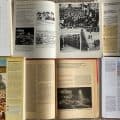Textbooks reflect the discourse on historical topics. A misunderstanding sometimes leads to undifferentiated textbook bashing.
9 (2021) 2 
Complex Teaching Material Production: An Interview
Dirk Vaihinger (Lehrmittelverlag Zürich) comments on the special role of history textbooks, and the future of the medium.
Whose History Do We Tell in Public?
The “comfort women” controversy raises the question of whose history a 21st century Germany wants to tell in public.
Elastic Textbooks: Pulling National Pasts Forward
History textbooks have always been changing. From textual narratives in the nineteenth century to the late twentieth century’s books filled with images, source documents and tasks. Now, in our postdigital twenty-first century, textbooks are moving online as apps and websites. But what happens to the content as textbooks’ materiality changes? I suggest here that textbooks are “elastic”. Like an elastic band, they pull the national(ist) past, which was once the reason to institutionalise history education, with them. First, textbooks pull on the curriculum. Second, textbooks pull linearity with them. Third, textbooks pull on monovocality. The piece concludes by noting some augmentations which may reshape the elastic band of national(ist) history.
Fake News, Conspiracy Theories and Textbooks
The article is dealing with the connection between fake news, conspiracy theories and school history textbooks. The spread of fake news and conspiracy theories in the public sphere represents a social challenge of the future. The leading medium textbook can be part of the answer to this challenge if it consistently aims to initiate critical-historical thinking.
Future(s) in History Textbooks
Digital learning tools for history lessons enjoy great popularity, at the same time textbook publishers top the sales lists of the book trade.
School History Textbooks in the 21st Century
How do school history textbooks deal with the new challenges posed in the 21st century as products of social processes of negotiation?






